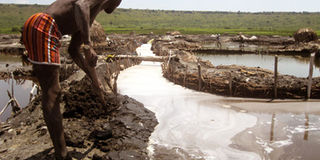Salt factory workers at risk over lack of protective gear

A man repairs the boundary of his salt pan near Lake Katwe. FILE PHOTO
What you need to know:
Alex Kwatampora, the project coordinator for Rwenzori Shinning Star Co. Ltd that has been contracted by government to take over Katwe salt industry, said: “Yes, demolishing that plant without protective gears is very dangerous but that work is under UDC as of now”
Kasese. Environmental activists have said casual labourers demolishing Katwe salt factory in Kasese District are at risk of cancer due to direct exposure to asbestos.
About 15 casual labourers, hired by individuals contracted by the Uganda Development Corporation (UDC) from Katwe-Kabatooro Town Council, are demolishing the old Katwe salt factory on the shores of Lake Edward to pave way for a new investor.
Asbestos was banned in the early 1980s in the West after it was discovered to cause cancer. Much of the salt factory is covered with asbestos.
However, Mr Nicholas Kagongo, an officer of National Association of Professional Environmentalists (NAPE), said the casual labourers are demolishing asbestos with bare hands and without nose masks, which poses a threat to their lives and the entire population in the town council.
“Being in proximity to Lake Edward, the wind from the lake shores releases asbestos fibers into the air and the population is inhaling it, which poses major risks to human health and the water sources such as Lake Edward where the community fetches water for domestic use and watering their animals,” Mr Kagongo said on Wednesday.
He added: “Hence in five years, the population in Katwe-Kabatoro Town Council is likely to suffer from lung cancer.”
Mr Kagongo urged the district leadership and the National Environmental Management Authority (Nema) to address the health challenge. Mr Jeconious Musingwire, the Nema officer-in-charge of south western region, expressed shock at the failure to provide protective gear to workers.
“What? This is very dangerous to those local workers and the community around, they should stop henceforth. Touching asbestos without protective gear has an accumulative effect in their bodies and causes cancer,” Mr Musingwire said.
He added: “Those who hired them should have approached Nema first for guidance on how to safely dispose of asbestos, those workers are already affected by asbestos.”
The area town clerk, Mr Godwin Bihanikire, accused the contracted firms of ignoring their directives.
“When we met the scrap dealers and other parties two weeks ago, we told them to use local workers and with protective gear. This is wrong and must be stopped,” he said.
The district environmental officer, Mr Augustine Kooli, said he was not aware that the demolition had started and was due to visit the site yesterday.
Mr Alex Kwatampora, the project coordinator for Rwenzori Shinning Star Co. Ltd that has been contracted by government to take over Katwe salt industry, said: “Yes, demolishing that plant without protective gears is very dangerous but that work is under UDC as of now”
The executive director of UDC, Dr Patrick Birungi, said: “I have instructed my staff to stop the exercise from now and I will cross-check what they have been doing and put things right.”
About salt factory
Government in March issued a licence to Rwenzori Shining Star Co. Ltd to revive a salt factory at Lake Katwe. Mr Ma Jia, the company’s business planning manager, said the project is a joint Uganda-China venture where each country is supposed to contribute 50 per cent of the costs.
Salt mining is the main activity around Lake Katwe and the industry has played a significant role in social and economic transformation. Katwe Salt Industry, which was constructed by German experts to process salt for human consumption, collapsed in the early 1970s during Idi Amin’s regime.



